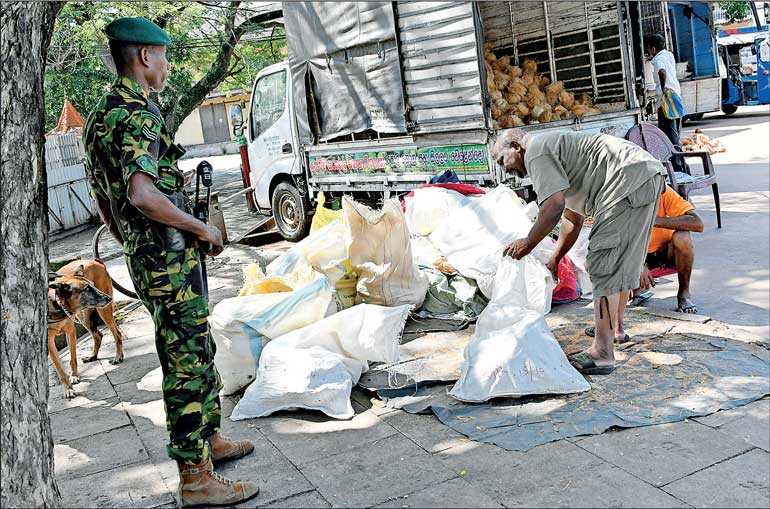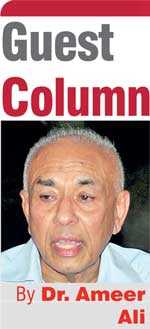Wednesday Feb 18, 2026
Wednesday Feb 18, 2026
Friday, 3 January 2020 00:00 - - {{hitsCtrl.values.hits}}

Gotabaya Rajapaksa’s immediate admission after winning the presidency that he was elected overwhelmingly if not solely by the Sinhalese voters, but that he would be a president for all communities was applauded by the whole country and even by foreigners. 
Some of the measures which he undertook, such as minimising the traditional pomposity and durbar attached to his office, choosing a leaner cabinet, reducing the tax burden on producers, middlemen and consumers, removing political interference in public appointments, economising public expenses and so on certainly won kudos even from his sceptics.
Quietly, they came to accept the fact that in spite of GR’s questionable past, the country needs an iron fist at the top to bring some sanity and order into the chaotic polity and economy created by former regimes.
Economic development over devolution of power
However, the most controversial aspect of his vision is the belief in solving the issue of national reconciliation through economic development rather than devolution of power. In an earlier piece, I captioned this strategy as ‘Political Exclusion & Economic Inclusion’ (19 December 2019), and pointed out that in a plural society, economic prosperity, instead of promoting acquiescence will accentuate antipathy, and the agitation for political inclusion will become irresistible. What is happening in Hong Kong now is a clear evidence of this phenomenon.
What is more problematic in GR’s strategy, and in a sense exposes his difficulty, is the argument that the “majority” is not willing for any power sharing. That shows that even if he would be willing as a devout Buddhist, the forces that brought him to power are not.
He is unable to release himself from the clutches of majoritarian politics. That so-called majority is an emotionally-charged mass led by an evangelical group of Buddhist supremacists, whose behaviour and pronouncements are in total contradiction to the philosophy and ethos of Buddhism.
The purveyors of this supremacist ideology are the real villains of Gautama. Their advocacy for a hegemonic Buddhist Sri Lanka is in no way different from that of the architects of Hindutva and Islamism. The hidden danger is that these extremist ideologies may feed into each other, deepen divisions, create chaos and ultimately sabotage Gotha’s vision.
Buddhist extremism re-emerging
There are already signs that Buddhist extremism, after taking a short holiday during and immediately after the Presidential Election, is re-emerging.
For example, slapping a Christian preacher by that pugnacious Ampitiya Sumanaratne, identified as a “saffron-clad thug”, attached to the Mangalaramaya temple in Batticaloa, and the erection of a Buddha statue in the precinct of a mosque at Nelundeniya in Kegalle are worrying signs of supremacist resurgence.
If these incidents are not nipped in bud by the judiciary and security forces, and if the culprits go unpunished that would certainly undermine GR’s original intention to be a president for all communities. Even the announcement that the National Anthem would be sung only in Sinhala at Independence Day Celebrations cast a supremacist shadow over it.
Immediately after GR’s victory, the cantankerous Ven. Gnanasara, the Secretary of BBS, announced that his organisation had served its purpose, that there was no need for it to continue any more, and that he was prepared to dissolve it. Instead, it still operates. The same was said by another priest attached to Ravana Balaya, but that organisation also continues to exist. Moreover, radical priests are dictating to the Government on who should be charged and on what offences, and who should be released and on what conditions.
These radicals are functioning virtually as an alternative government. Is the President’s silence on these matters to be read as condonation? Even if he wants to condemn the highhandedness of these villains his hands are tied because of the forthcoming General Elections in which he expects his brother’s SLPP to win with a two-thirds majority.
In the meantime, it is imperative that the economy of the country needs strengthening and economic growth with equity be pursued. GR should be congratulated for appointing Professor W.D. Lakshman, a first class economist and, more than that, an impassioned humanist, as the Governor of the Central Bank. With Lakshman’s impeccable credentials, his reported reservations about the supposed benefits of neoliberalism and Washington Consensus are highly warranted and to be applauded.
However, the Central Bank does not have a magic wand to produce economic miracles. There is a rising consensus among world economists that in a world of highly integrated and heavily financialised economies, central banks are becoming an “institutional anachronism”. Even the most brilliant of central bank governors therefore, can only take care of the macro fundamentals of the economy, and advice the government on the required direction of the fiscal side.
Unlike monetary policy, both fiscal and social policies are entirely the domain of the President and his Parliament. Of the three, the primacy of social policy should not be under-rated if the stimulus provided by the other two are to produce robust growth.
One neglected aspect of social policy in current literature is the role it plays in building a harmonious society. Without societal harmony an economy cannot function at its full potential, and that harmony is paramount in plural societies. One country that realised this paramountcy is Singapore, a country far smaller in size than and poorer in natural resources than Sri Lanka. Today it is an economic power house. GR’s surrender to the supremacists and his determination to achieve societal harmony solely through economic development does not augur well even to the economy.
Finally, harmony cannot be achieved through strengthening national security. Singapore has very strong security, but its forces are not to be seen on the streets and in every corner. They are invisible and Singaporeans are moving freely without any dear and contributing maximally to the country’s growth and prosperity.
Fear is the enemy of social harmony and economic development. The supremacists by endangering this harmony are jeopardising the nation’s economic recovery, and without that recovery GR’s vision will remain just that.
(The writer is attached to the School of Business and Governance, Murdoch University, Western Australia.)